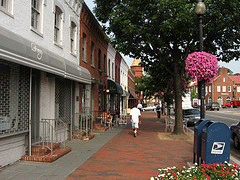I'm glad to see I'm not the only one thinking about the limits of the “30 percent of your income” housing affordability definition.
This Washington City Paper article gets into the idea that housing and transportation together is a better measure of affordability, but then also addresses the idea that I have also raised that “how much disposable income you have left over after paying for housing” might be a better measure of whether your housing costs too much than what percentage you are paying.
It's an interesting application of this angle to note, as the DC Office of Revenue recently did, that DC Millenials' salaries are enough higher than those in many other cities that's DC's could be considered “more affordable” for them than other cities, such as Baltimore, even though they are spending a median 44 percent of their income on rent.
It's definitely a noteworthy point that a median earner with a median 1-BR apartment in Boston or San Francisco would be much worse off than one in DC, and folks in cheaper cost of living cities at least not necessarily better off.
But does that mean the city is really “affordable”?
After all, the critique of the 30 percent housing affordability measure says that housing costs are always going to fall hardest on the poor. So to say that DC is really a more affordable city broadly speaking you should be at least as interested, if not more, in how well it houses its lower income workers and fixed-income seniors, rather than its professional Millenials.
How do wages on the lower end of the scale in DC compare to elsewhere, or number of jobs available to those without a college degree? I don't have a full answer to that. Minimum wage in DC is going up to $9.50/hour—nowhere near, for example, Seattle's groundbreaking $15. Labor force participation rate has been dropping. Perhaps this is the next number crunching project the Office of Revenue can take on.
4/28/15 edited to add: The most recent analysis of impediments to fair housing for DC, conducted by Daniel Lauber, has some good and relevant data. Such as: “Of the 48,000 households that spend half or more of their income on housing, 85 percent are low-income households.” This reinforces that while whether that other 15 percent are really cost burdened or not is an interesting question, it is definitely not the heart of DC's affordability question. Thanks for the note, Dan!
(Photo credit: Flickr user Ken Lund, CC BY-SA 2.0)






I have almost no disposable income after paying for housing and my utilitiy bills. Not a pleasant way to live.